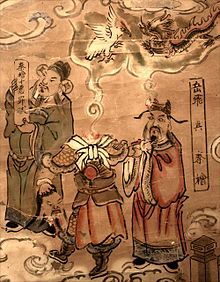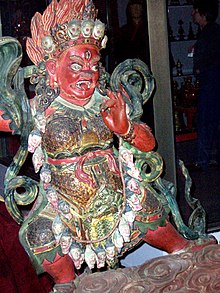Yama (Buddhism)
Yánluó (![]() ) (Chinese 閻羅王 [simplified: 阎罗王], Pinyin: Yánluówáng, in German also King Yan or Yan Wang [
) (Chinese 閻羅王 [simplified: 阎罗王], Pinyin: Yánluówáng, in German also King Yan or Yan Wang [![]() or English romanized Yin Low [
or English romanized Yin Low [![]() ) is the god of death and as "King of Hell" the ruler of the afterlife (Diyu) as well as overseer of the "Ten Kings of Hell". In his honor hell money is offered as a burnt offering. He is a central deity in Daoism and in Chinese mythology, as well as under the name "(Great) King Enma" (Japanese 閻魔大王, Enma Dai-Ō [
) is the god of death and as "King of Hell" the ruler of the afterlife (Diyu) as well as overseer of the "Ten Kings of Hell". In his honor hell money is offered as a burnt offering. He is a central deity in Daoism and in Chinese mythology, as well as under the name "(Great) King Enma" (Japanese 閻魔大王, Enma Dai-Ō [ ![]() ]) part of Japanese mythology.
]) part of Japanese mythology.

A headless ghost of a recently deceased man awaits Yánluó's judgment at the "Earth Court". The plaque held by the bailiff reads: "Qin Hui's ten dastardly crimes" (Chinese underworld troll, 19th century).

Tibetan representation of Yánluó (Field Museum of Natural History, Chicago).
Appearance and function
Yánluó is traditionally depicted in Daoism as a tall man who often has a red face with bulging eyes and/or an evil stare. He wears a long black beard. He is dressed in traditional Chinese red robes. On his head he wears either a Chinese judge's hat or a crown with the character for "king" (Chinese 王, Pinyin Wáng). He possesses a book (depending on the depiction, also a tablet, scroll, or nothing of the sort) with the dates of death for each soul. Depending on the region, representations of Yánluó may vary; in Tibet, therefore, he is depicted with all of the above attributes, but not in Chinese dress. Occasionally he is depicted riding a buffalo.
Yánluó rules over the Diyu, the afterlife. There he holds the "earth court" for all the deceased. After his judgment, they are led either to heaven or to a labyrinth of levels and chambers in the underworld ("Buddhist hell") to atone for their sins. Depending on the interpretation of the faith, there are eight, ten or eighteen sub-courts, the last one being for thieves and murderers under the judge Chujiang. Good deeds in life are rewarded with rebirth in a higher form of life, while transgressions are atoned for by torture and torment or a lower form of rebirth.
According to some Daoist views, Yánluó sends messengers from the Diyu to the living to dissuade them from a dissolute, hedonistic lifestyle and to warn them of the dramatic consequences they will face at the Earth Court if they do not.
In addition, in Daoism there is the view that a deceased person needs a certain amount of hell money at the "earth court" in the afterlife to pay a (partial) indulgence for his misdeeds in his earthly life. The front of hell money notes therefore usually shows a portrait of the Jade Emperor Yu Di, who according to Daoist understanding is the "ruler of heaven", his signature (romanized as "Yu Wong" or "Yuk Wong") and the signature of Yánluó as the "king of hell" (romanized as "Yin Low").
Yánluó in other Buddhist currents and in Hinduism
The death god Yánluó is known by other names in other streams of Buddhism, as Daoism spread from China to Korea and Japan, mixing with regional characteristics. In Japan, it is called "Enma" (閻魔, also Yenma), "King Enma" (閻魔王, Enma-ō), and "Great King Enma" (閻魔大王, Enma Dai-Ō). According to a proverb, Enma tears out the tongues of liars while still in earthly life (嘘をつけばと閻魔様に舌を抜かれる). In Korea, Yánluó is known as "Yeomna" (염라) and "Great King Yeomna" (염라대왕, Yŏmna Daewang). In Vietnam, the Buddhist deity exists as "Diêm La" or "Diêm Vương".
In Hinduism, its equivalent is the death god "Yama" ( ![]() ).
).
Search within the encyclopedia